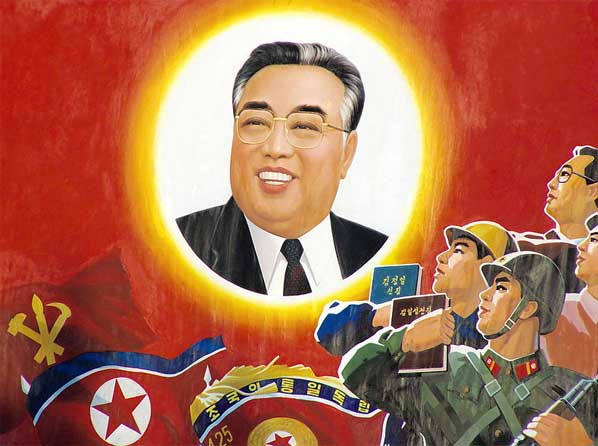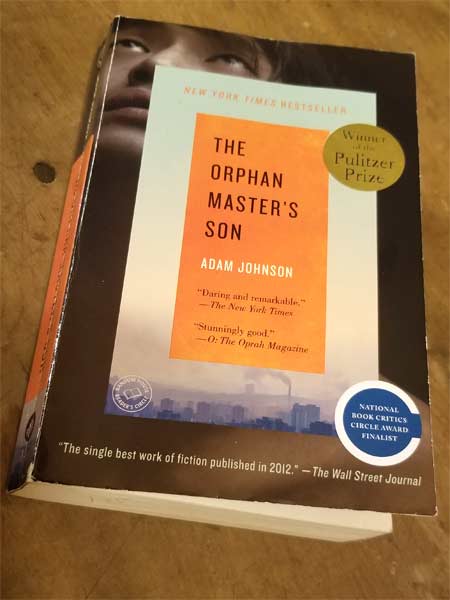The Orphan Master's Son by Adam Johnson
My favorite books - a book review by Janice Boling
I like to read Pulitzer Prize winning books, and when I see that familiar gold disc on a cover, I automatically pick it up. The Orphan Master’s Son, published in 2012 and winner of the 2013 Pulitzer Prize for Fiction, does not disappoint. It is a really intense read if you like to learn about other cultures, and get inside the head of someone very different from the average American.
A few chapters into this account of life in North Korea during the regime of Kim Jong II, I began to experience a whole new level of love for the good ole USA. It’s worth reading for that alone.
With The Orphan Master’s Son, Adam Johnson does a remarkable job of documenting awful crimes against humanity, while keeping the story a page-turner. Even with multiple cringe-worthy scenes, it’s like the reader is brain-washed enough to look over things that would ordinarily cause disgust and horror.
Who is Pak Jun Do?
The main character, an average citizen named Pak Jun Do, is one of the most memorable heroes I have ever encountered. His endurance in spite of intolerable circumstances is very inspiring. I am still thinking about Jun Do a week after finishing the novel. To me, that is the hallmark of a good book.
The Orphan Master’s Son is a political thriller and epic love story.
It’s a mesmerizing tale of a man searching for meaning in a world where humans are not allowed any freedoms and horrific suffering is the norm.
The story starts out with loudspeakers bringing news to the people. Citizens are instructed to turn up the volume and listen closely. The broadcaster spews out propaganda, covering everything from recipe contests to the offshore activities of evil American aggressors. The broadcast ends with a recap of all the rumors circulating around Pyongyang, telling the listeners which ones to believe.
Part one of The Orphan Master’s Son is titled The Biography of Jun Do.
Jun Do is not really an orphan but everyone assumes so because his father runs an orphanage. Wrong assumptions, the plight of humanity, and the strength of the human spirit are themes that run through the book.
The tale takes us with Jun Do as he willingly does forced labor, works as a radio operator aboard a fishing vessel, is sent into the uranium mines, the prison camps, and the torture chambers. (Until I read this book, I never dreamed that such horrible conditions still existed on earth.)

Poster of Kim Jong II provided by Wiki Commons
Part Two of The Orphan Master’s Son is titled The Confessions of Commander Ga.
In this section, Pak Jun Do has been imprisoned for a year. While deep in a mine, he kills a high ranking official, and emerges from prison as the “new” Commander Ga. The story really gets surreal at this point with everyone pretending (out of fear) that Pak Jun Do is the Commander.
The love story kicks in when Commander Ga (really Pak Jun Do) is accepted by Sun Moon. His many sacrifices for her well-being and happiness remind me of Shakespeare’s Romeo and Juliet, a play that is still relevant after hundreds of years. I suspect that Adam Johnson’s novel will be relevant for a long time, too.
Has life in North Korea improved since the death of Kim Jong II?
I doubt it. North Koreans are not allowed to travel, common items like condoms are illegal, the internet is outlawed, and countless reports of crimes against humanity continue to surface.
After reading The Orphan Master’s Son and learning that such cruelty still exists in the 21st century, I am ashamed that the world turns it head and refuses to acknowledge what is going on. It seems like in 2022, the world including North Korea, should be a better place.
Maybe that is Mr. Johnson’s intent. Uncovering rot and bringing it to the surface makes it possible for light to penetrate into the darkness. I sure hope that is the case for North Korea, but twelve years since the book was published not much has changed for the better.
I don’t know what I can do to help the North Koreans, but I give them credit. They are a strong people to stay alive under such harsh government rules and regulations. Watching loved ones get dragged away to work camps, and living in fear your whole life is a nightmare much like the Jews experienced during Hitler’s regime.
Looks like something could be done to help the underdogs of the world. How can world leaders just stand by and let such evil continue? I don’t want war, but I would like an end to suffering. I guess I’ll have to wait just like the North Koreans.
